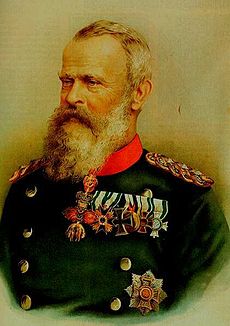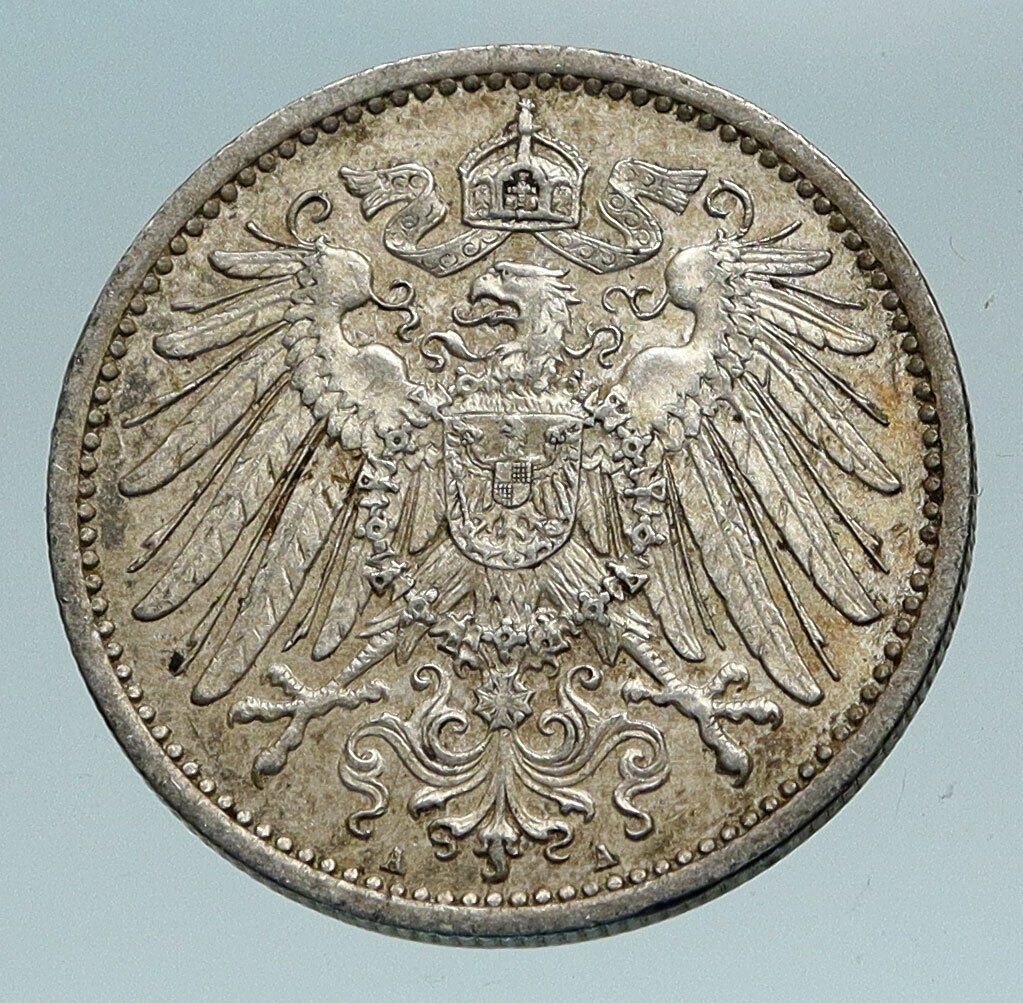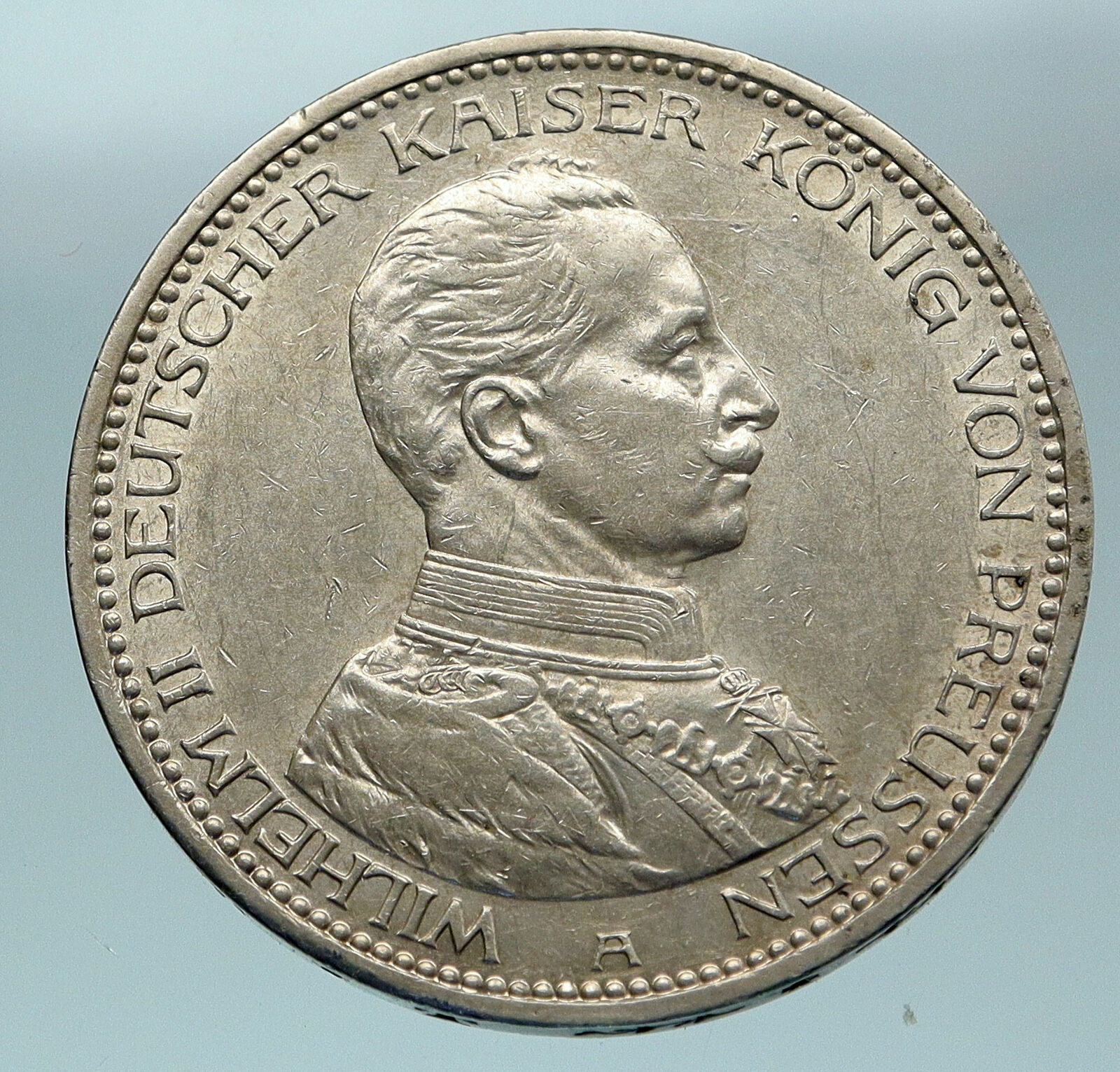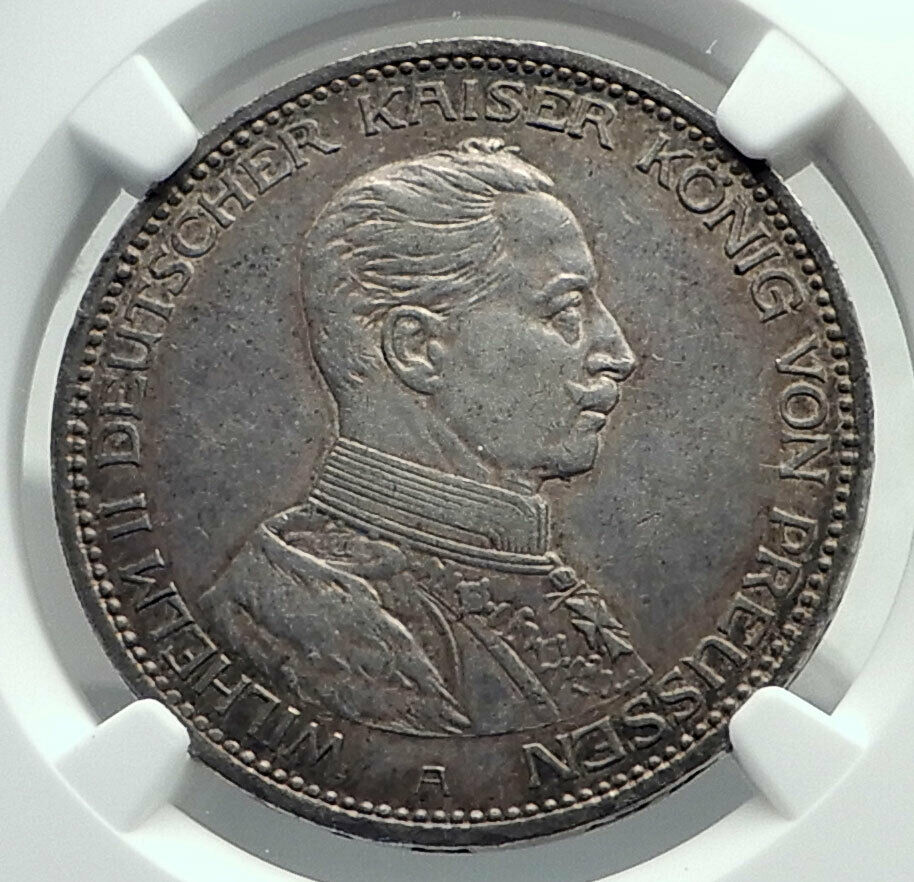|
German States – Bavaria under Otto I –
90th Birthday of Prince Regent Luitpold
1911 D Silver 3 Mark 33mm (16.67 grams) 0.900 Silver (0.4823 oz. ASW)
Reference: KM# 997
LVITPOLD PRINZ- REGENT V. BAYERN D 1821*12 MÆRZ*, Bearded bust facing right, year and mintmark below.
DEUTSCHES REICH * DREI MARK *, Eagle with crown above, year.
Edge Lettering: GOTT MIT UNS
You are bidding on the exact item pictured, provided with a Certificate of Authenticity and Lifetime Guarantee of Authenticity.
 Luitpold, Prince Regent of Bavaria (German: Prinzregent Luitpold Karl Joseph Wilhelm Ludwig von Bayern) (12 March 1821 – 12 December 1912), was the de facto ruler of Bavaria from 1886 to 1912, due to the incapacity of his nephews, King Ludwig II for three days and King Otto for 26 years. Luitpold, Prince Regent of Bavaria (German: Prinzregent Luitpold Karl Joseph Wilhelm Ludwig von Bayern) (12 March 1821 – 12 December 1912), was the de facto ruler of Bavaria from 1886 to 1912, due to the incapacity of his nephews, King Ludwig II for three days and King Otto for 26 years.
Luitpold was born in Würzburg, the third son of King Ludwig I of Bavaria and his wife, Therese of Saxe-Hildburghausen. He was the younger brother of King Maximilian II of Bavaria and of King Otto of Greece. Luitpold was in line to succeed to the throne of the Kingdom of Bavaria, and was also heir presumptive to the throne of Greece, since his brother Otto had no children. However, the Greek law of succession required that Otto’s heir should belong to the Greek Orthodox Church. Otto was deposed in 1862 and replaced by Prince William of Denmark, who became George I, King of the Hellenes. Otto died in 1867, leaving Luitpold and his descendants as representatives of Otto’s claim. However, Luitpold never pursued that claim.
At the age of fourteen, Luitpold joined the Bavarian Army and was promoted to Captain of the Artillery in 1835. During the revolutions of 1848, Prince Luitpold mediated and facilitated an audience of discontented citizens with his father. During the rule of his brother Maximilian II (1848-64), Luitpold did not play a significant political role.
With the reign of his nephew Ludwig II (1864-1886), Prince Luitpold had increasingly to represent the royal house due to the king’s long absence from the capital. In the Austro-Prussian War in 1866 Luitpold was commander of the 3rd Royal Bavarian Division. In 1869, he became Inspector General of the Bavarian Army, during the Franco-Prussian War in 1870 and 1871, he represented Bavaria in the German General Staff. In that capacity, he handed over Ludwig’s Kaiserbrief on 3 December 1870, in which Ludwig endorsed the creation of the German Empire with the King of Prussia as Emperor.
Since Ludwig, who nonetheless regretted Bavaria’s loss of independence, refused to attend Wilhelm’s 10 January proclamation as Emperor in the Palace of Versailles, Ludwig’s brother, Prince Otto, and his uncle Luitpold represented him in the Palace of Versailles. Otto then criticized the celebration as ostentatious and heartless in a letter to his brother. In 1876, Luitpold was appointed Field Marshal.
On 10 June 1886, Luitpold’s nephew King Ludwig II was declared mentally incompetent and Luitpold was named Regent. Luitpold’s part is still controversial. Following Ludwig II’s mysterious death a few days later, his brother Otto assumed the throne. However, Otto was likewise (or more so) mentally incapable of reigning, and Luitpold continued to serve as regent. Prince Luitpold was even accused by some people of the murder of his nephew, but soon the decent and affable prince became one of Bavaria’s most popular rulers. One of his first actions (on 1 August 1886) was to open several of the palaces of Ludwig II to the public.
Politically, Luitpold remained largely passive. His governments gradually moved away from the previous anti-Catholic Kulturkampf policies. This development culminated in 1912 when the appointment of the Centre Party politician Georg von Hertling as minister president; this also effectively brought about a parliamentarisation of the government, as Hertling’s Centre Party was the largest group in the Landtag.
During the regency of Prince-Regent Luitpold relations between Bavarians and Prussians remained cold as Bavarians resented Prussia’s strategic dominance over the empire.
Luitpold continued to serve as regent until 1912, when he contracted bronchitis and died in Munich. He was succeeded by his eldest son, Prince Ludwig, who remained as regent for another year before becoming king in his own right as Ludwig III. He is buried in the crypt of the Theatinerkirche in Munich.
The Prinzregentenzeit (“prince’s regent’s time”), as the regency of Luitpold is often called, was due to the political passiveness of Luitpold during an era of the gradual transfer of Bavarian interests behind those of the German empire. In connection with the unhappy end of the preceding rule of King Ludwig II, this break in the Bavarian monarchy looked even stronger. Finally, the constitutional amendment of 1913 brought the determining break in the continuity of the king’s rule in the opinion of historians, particularly as this change had been granted by the Landtag as a House of Representatives and meant therefore indirectly the first step from constitutional to the parliamentary monarchy. Today the connection of these two developments is regarded as a main cause for the unspectacular end of the Bavarian kingdom without opposition in the course of the November revolution of 1918. However the course of his 26-year regency Luitpold knew to overcome, by modesty, ability and popularity, the initial uneasiness of his subjects. These prince’s regent’s years were transfigured, finally – above all in the retrospect – to a golden age of Bavaria, even if one mourned the “fairy tale king” Ludwig II furthermore what happens in a folkloric-nostalgic manner till this day.
Tutored as a child by Domenico Quaglio the Younger, Luitpold had a great feeling for the arts. Luitpold’s years as regent were marked by tremendous artistic and cultural activity in Bavaria where they are known as the Prinzregentenjahre (“The Prince Regent Years”) or the Prinzregentenzeit. Bavaria prospered under a liberal government and Munich became a cultural centre of Europe. Thomas Mann wrote about this period “Munich shone” (1902 Gladius Dei). Schwabing became an important artists’ quarter in Munich.
There are numerous streets in Bavarian cities and towns called Prinzregentenstrasse or Luitpoldstrasse. Many institutions are named in Luitpold’s honour including the Prinzregententheater in Munich and the Luitpoldarena and the Luitpoldhalle in Nürnberg. In 1891 Luitpold established the Luitpold Gymnasium in Munich. Prinzregententorte is a multi-layered cake with chocolate butter cream named in his honour. The vessel SMS Prinzregent Luitpold of the Imperial German Navy and the Luitpold Coast were named for Luitpold.
Luitpold’s great passion next to the arts was hunting, and his legendary hunts took place throughout Bavaria.
 Otto I (German: Otto Wilhelm Luitpold Adalbert Waldemar; 27 April 1848 – 11 October 1916) was King of Bavaria from 1886 to 1913. However, he never actively ruled because of alleged severe mental illness. His uncle, Luitpold, and his cousin, Ludwig, served as regents. Otto I (German: Otto Wilhelm Luitpold Adalbert Waldemar; 27 April 1848 – 11 October 1916) was King of Bavaria from 1886 to 1913. However, he never actively ruled because of alleged severe mental illness. His uncle, Luitpold, and his cousin, Ludwig, served as regents.
Ludwig deposed him in 1913, a day after the legislature passed a law allowing him to do so, and became king in his own right.
Otto was the son of Maximilian II and his wife, Marie of Prussia, and the younger brother of Ludwig II. He is not to be confused with King Otto of Greece, his uncle and godfather.
Mental incapacity
After the Franco-Prussian War, Otto became very depressed and anxious, which worried his family. Otto had spells during which he slept poorly for days and acted out followed by periods of time during which he was perfectly normal and lucid. His illness progressively grew worse. Ludwig was horrified because he had been counting on Otto to marry and have a son who could eventually inherit the throne. Otto was placed under medical supervision, and reports about his condition were sent by spies of Prussian Chancellor, Otto von Bismarck. Doctors reported that Otto was mentally ill in January 1872. From 1873, he was held in isolation in the southern pavilion of Nymphenburg Palace. His attending physician was Dr. Bernhard von Gudden, who later diagnosed Otto’s brother, Ludwig, as mentally ill without bothering to examine him and without asking him a single question, which raises questions about his competence and his motives. Both Ludwig and Otto despised Prussia, and their uncle, Luitpold, and Gudden supported Prussia’s rise to dominance. Some contemporaries believed that Gudden’s diagnoses of Otto and Ludwig were motivated by political considerations and that more could and should have been done to help and treat Otto. Some contemporaries also believed that Bismarck did not want Ludwig or Otto to remain in power and decided to replace the brothers with their malleable uncle, Luitpold.
During Corpus Christi Mass in 1875 in the Frauenkirche in Munich, Otto, who had not attended the church service, rushed into the church wearing hunting clothes and fell on his knees before the celebrant, Archbishop Gregor von Scherr, to ask forgiveness for his sins. The High Mass was interrupted, and the prince did not resist when he was led away by two church ministers. Otto was then moved to Schleissheim Palace and was effectively held prisoner there, much to his dismay. Gudden made no effort to treat him; it is possible that Otto was heavily drugged. Otto’s last public appearance was his presence at the side of his brother at the King’s parade on 22 August 1875, at the Marsfeld in Munich. From 1 June 1876, he stayed for a few weeks in the castle at Ludwigsthal in the Bavarian Forest. In the spring of 1880, his condition worsened. In 1883, he was confined under medical supervision in Fürstenried Palace near Munich, where he would remain for the rest of his life. The palace had been specially converted for his confinement. Ludwig occasionally visited him at night and ordered for no violence to be used against him.
Otto became king after Ludwig died, but he was never truly allowed to reign. In 1886, the senior royal medical officer wrote a statement declaring that Otto was severely mentally ill. It has been claimed that Ludwig had a schizotypal personality disorder[[citation needed] and that Otto suffered from schizophrenia. It has also been persuasively argued that Otto’s problems were the result of contracting syphilis, which would also account for his physical problems, particularly the paralysis from which he suffered from in later years.
King of Bavaria
On 10 June 1886, the Bavarian cabinet declared King Ludwig II unable to rule and appointed his uncle, Luitpold, as Prince Regent. Ludwig died only three days later under unexplained circumstances. That meant that Otto became king on 13 June 1886. He was, however, unable to rule. The official explanation “the King is melancholic”. The proclamation of his inauguration was read to him at Fürstenried Castle the next day, but he failed to understand it.
End of reign and death
Luitpold kept his role as Prince Regent until he died in 1912 and was succeeded by his son Ludwig, who was Otto’s first cousin. By then, it had been obvious for some time that Otto would never emerge from seclusion or be mentally capable of actively reigning. Almost as soon as Ludwig became regent, elements in the press and larger society clamoured for Ludwig to become king in his own right.
Accordingly, the constitution of Bavaria was amended on 4 November 1913 to include a clause specifying that if a regency for reasons of incapacity lasted for ten years, with no expectation that the King would ever be able to reign, the Regent could end the regency, depose the King and assume the crown himself with the assent of the legislature. The following day, Prince Regent Ludwig ended the regency and proclaimed his own reign as Ludwig III. The parliament assented on 6 November, and Ludwig III took the constitutional oath on 8 November. King Otto was permitted to retain his title and honours for life.
Otto died unexpectedly on 11 October 1916 from a volvulus (an obstruction of the bowel). His remains were interred in the crypt of the Michaelskirche in Munich. Bavarian tradition caused the heart of the king to be placed in a silver urn and sent to the Gnadenkapelle (Chapel of the Miraculous Image) in Altötting, beside those of his brother, father and grandfather.
  Germany, officially the Federal Republic of Germany is a federal parliamentary republic in western-central Europe. It includes 16 constituent states and covers an area of 357,021 square kilometres (137,847 sq mi) with a largely temperate seasonal climate. Its capital and largest city is Berlin. With 81 million inhabitants, Germany is the most populous member state in the European Union. After the United States, it is the second most popular migration destination in the world. Germany, officially the Federal Republic of Germany is a federal parliamentary republic in western-central Europe. It includes 16 constituent states and covers an area of 357,021 square kilometres (137,847 sq mi) with a largely temperate seasonal climate. Its capital and largest city is Berlin. With 81 million inhabitants, Germany is the most populous member state in the European Union. After the United States, it is the second most popular migration destination in the world.
Various Germanic tribes have occupied northern Germany since classical antiquity. A region named Germania was documented before 100 CE. During the Migration Period the Germanic tribes expanded southward. Beginning in the 10th century, German territories formed a central part of the Holy Roman Empire. During the 16th century, northern German regions became the centre of the Protestant Reformation.
The rise of Pan-Germanism inside the German Confederation resulted in the unification of most of the German states in 1871 into the Prussian-dominated German Empire. After World War I and the German Revolution of 1918-1919, the Empire was replaced by the parliamentary Weimar Republic. The establishment of the Third Reich in 1933 led to World War II and the Holocaust. After 1945, Germany split into two states, East Germany and West Germany. In 1990, the country was reunified.
 In the 21st century, Germany is a great power and has the world’s fourth-largest economy by nominal GDP, as well as the fifth-largest by PPP. As a global leader in several industrial and technological sectors, it is both the world’s third-largest exporter and importer of goods. Germany is a developed country with a very high standard of living sustained by a skilled and productive society. It upholds a social security and universal health care system, environmental protection and a tuition free university education. In the 21st century, Germany is a great power and has the world’s fourth-largest economy by nominal GDP, as well as the fifth-largest by PPP. As a global leader in several industrial and technological sectors, it is both the world’s third-largest exporter and importer of goods. Germany is a developed country with a very high standard of living sustained by a skilled and productive society. It upholds a social security and universal health care system, environmental protection and a tuition free university education.
Germany was a founding member of the European Union in 1993. It is part of the Schengen Area, and became a co-founder of the Eurozone in 1999. Germany is a member of the United Nations, NATO, the G8, the G20, and the OECD. The national military expenditure is the 9th highest in the world. Known for its rich cultural history, Germany has been continuously the home of influential artists, philosophers, musicians, sportsmen, entrepreneurs, scientists and inventors.
|





 Luitpold, Prince Regent of Bavaria (German: Prinzregent Luitpold Karl Joseph Wilhelm Ludwig von Bayern) (12 March 1821 – 12 December 1912), was the de facto ruler of Bavaria from 1886 to 1912, due to the incapacity of his nephews, King Ludwig II for three days and King Otto for 26 years.
Luitpold, Prince Regent of Bavaria (German: Prinzregent Luitpold Karl Joseph Wilhelm Ludwig von Bayern) (12 March 1821 – 12 December 1912), was the de facto ruler of Bavaria from 1886 to 1912, due to the incapacity of his nephews, King Ludwig II for three days and King Otto for 26 years.  Otto I (German: Otto Wilhelm Luitpold Adalbert Waldemar; 27 April 1848 – 11 October 1916) was King of Bavaria from 1886 to 1913. However, he never actively ruled because of alleged severe mental illness. His uncle, Luitpold, and his cousin, Ludwig, served as regents.
Otto I (German: Otto Wilhelm Luitpold Adalbert Waldemar; 27 April 1848 – 11 October 1916) was King of Bavaria from 1886 to 1913. However, he never actively ruled because of alleged severe mental illness. His uncle, Luitpold, and his cousin, Ludwig, served as regents. 
 Germany, officially the Federal Republic of Germany is a federal parliamentary republic in western-central Europe. It includes 16 constituent states and covers an area of 357,021 square kilometres (137,847 sq mi) with a largely temperate seasonal climate. Its capital and largest city is Berlin. With 81 million inhabitants, Germany is the most populous member state in the European Union. After the United States, it is the second most popular migration destination in the world.
Germany, officially the Federal Republic of Germany is a federal parliamentary republic in western-central Europe. It includes 16 constituent states and covers an area of 357,021 square kilometres (137,847 sq mi) with a largely temperate seasonal climate. Its capital and largest city is Berlin. With 81 million inhabitants, Germany is the most populous member state in the European Union. After the United States, it is the second most popular migration destination in the world. In the 21st century, Germany is a great power and has the world’s fourth-largest economy by nominal GDP, as well as the fifth-largest by PPP. As a global leader in several industrial and technological sectors, it is both the world’s third-largest exporter and importer of goods. Germany is a developed country with a very high standard of living sustained by a skilled and productive society. It upholds a social security and universal health care system, environmental protection and a tuition free university education.
In the 21st century, Germany is a great power and has the world’s fourth-largest economy by nominal GDP, as well as the fifth-largest by PPP. As a global leader in several industrial and technological sectors, it is both the world’s third-largest exporter and importer of goods. Germany is a developed country with a very high standard of living sustained by a skilled and productive society. It upholds a social security and universal health care system, environmental protection and a tuition free university education.




